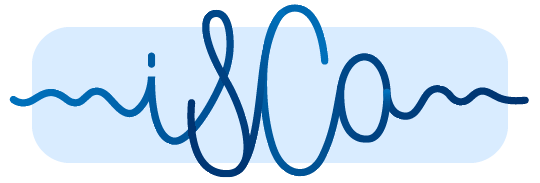- Home
- Activities
- Special Interest Groups
- Audio Visual Speech - AVISA
Auditory-Visual Speech (AVISA)

Click here to visit the SIG website!
Aims. The AVISA objectives are to: create a scientific link between researchers and others working in the various disciplines associated with audiovisual speech processing by humans or by machines; facilitate better understanding of the cognitive processes involved in the production and perception of audio-visual speech communication through the audible and visible gestures of the vocal tract and of associated body gestures; facilitate the modelling of speech gestures for realistic animation of synthetic actors and for automatic recognition of linguistic and communicative gestures transmitted through the auditory and visual modalities; share linguistic knowledge through the study of audio-visual speech in as many languages as possible, including sign languages and cued speech; favor the worldwide dissemination of knowledge, and make it available to the international community, in particular to students of speech science, clinicians and industrialists.
Motivation. AVISA was created to promote interest and activity in auditory-visual speech processing and related areas. AVISA was the second ISCA SIG to form, starting its official business on December 5, 1998, at the AVSP'98 (Auditory Visual Speech Processing) meeting in Terrigal, New South Wales, Australia. AVISA was first conceived by Christian Benoît, who wanted to see the auditory-visual speech community come together in a more formal way.
Board. Elections have been organised for the SIG officers on July 2013:
- Chairperson: Christopher Davis (University of Western Sydney, Australia)
- Vice-Chairman: Jonas Beskow (KTH Speech Music and Hearing, Sweden)
- Secretary/treasurer: Slim Ouni (University of Lorraine, France)
- Student representative: Helen Bear (University of East Anglia, Norwich, UK)
- ISCA liaison officer: Alexandra Jesse (University of Massachusetts Amherst, USA)
ISCA-supported events
AVISA supports the series of Auditory-Visual Speech Processing (AVSP) workshops
- AVSP 2019, 10/8-11/8, Melbourne, Australia
- AVSP 2017, 25/8-26/8, Stockholm, Sweden, Proceedings
- Joint FAA/AVSP 2015, 11/9-13/9 ,Vienna, Austria, Proceedings
- AVSP 2013, 29/8-1/9, St. Jorioz, France, Proceedings
- AVSP 2011, 31/8-3/9, Volterra, Italy, Proceedings
- AVSP 2010, 30/9-3/10, Hakone, Kanagawa, Japan, Proceedings
- AVSP 2009, 10/9-13/9, University of East Anglia, Norwich, UK, Proceedings
- AVSP 2008, 26/9-29/9, Tangalooma Wild Dolphin Resort, Moreton Island, Queensland, Australia, Proceedings
- AVSP 2007, 31/8-3/9, Hilvarenbeek, The Netherlands, Proceedings
- AVSP 2005, 24/7-27/7, Vancouver Island, BC, Canada, Proceedings
- AVSP 2003, 4/9-7/9, St. Jorioz, France, Proceedings
- AVSP 2001, 7/9-9/9, Scheelsminde, Denmark, Proceedings
- AVSP 1999, 7/8-9/8, University of California, Santa Cruz, USA, Proceedings
- AVSP 1998, 4/12-6/12 1998, Terrigal, Sydney, Australia, Proceedings
- AVSP 1997, 26/9-27/9, Rhodes, Greece, Proceedings
AVISA also supported the series of Visual Speech Synthesis (LIPS) challenges
- LIPS 2009, University of East Anglia, Norwich, UK (co-located with AVSP 2009)
- LIPS 2008, Brisabane, Australia (co-located with Interspeech 2008)
Prix Christian Benoît. The Prix Christian Benoît-Christian Benoît Award and the Association Christian Benoît (ACB) were initiated to honor the memory of Christian Benoît. The Award is intended to be given to a young researcher whose work shows great promise and will be given to a doctoral graduate whose PhD and further scientific work is in the Speech Communication domain. The award provides financial support for the development of a multi-media product promoting his/her work. The Award is valued at 7,500€. Past awardees of Prix Christian Benoît are:
- 2019 - Sankar Mukherjee, (CTNSC, Istituto Italiano di Tecnologia, Ferrara, Italy) "Neuro-behavioral Aware Conversational Agent
- 2017 - Marcin Włodarczak (Linguistic dpt,. Stockholm University, Sweden) Hidden events in turn-taking
- 2015 - Mathilde Fort (Center for Brain and Cognition, Speech Acquisition and Perception Group, Universitat Pompeu Fabra, Barcelona, Spain) Infant learning from the Eyes and the Mouth of a talking face
- 2013 - Samer Al Moubayed (KTH, Stockholm, Sweden) The Furhat talking head - A device for studying face-to-face situated communication
- 2011 - Thomas Hueber (Gipsa-lab, Grenoble, France) Ultraspeech II: Toward a real-time silent speech interface driven by ultrasound and video imaging
- 2009 - Sascha Fagel (Berlin Institute of Technology, Germany) Thea, Talking Heads for Elderly and Alzheimer Patients in Ambient Assisted Living
- 2007 - Susanne Fuchs (ZAS, Berlin, Germany) Vocal tract geometries and speaker-specific articulatory strategies
- 2004 - Olov Engwal (KTH in Stockholm, Sweden) ARTUR, an articulation tutor
- 2002 - Johanna Barry (Bionic Ear Institute, University of Melbourne, Australia) ToneDoctor
- 2000 - Tony Ezzat (Centre for Biological and Computational Learning, MIT, Massachusetts, USA) Mary, A Videorealistic Text-to-audiovisual speech synthesizer
